Singapore Budget 2020: Summary of Government Initiatives
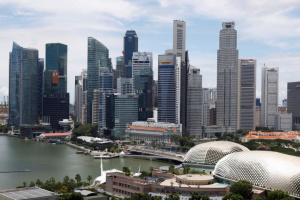
The Singapore Budget for 2020 was delivered by Mr Heng Swee Keat on 18 February 2020 at 3 pm.[1] Mr Heng is the Deputy Prime Minister and Minister of Finance as of February 2020.[2] This budget covers the financial year of April 2020 to March 2021.[3] The government has set aside a S$106 billion budget to (i) Grow the Singapore economy (ii) Care for Singaporeans (iii) Sustain Singapore’s success (iv) Build Singapore as a community.[4][5][6]
General background
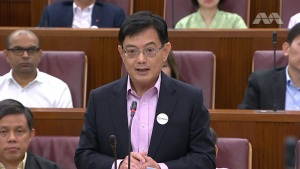
Weak economic growth
In 2019, Singapore’s economy grew by a modest 0.7%. This is the weakest growth since the 2008 Financial Crisis.[7] Two days before the release of the Budget, Singapore’s Ministry of Trade and Industry downgraded Singapore’s growth forecast from between 0.5 - 2.5% to between -0.5 - 1.5%.[8] This indicates a possible recession for Singapore.
COVID-19
Taking into account the spread of COVID-19 amidst increasing protectionism and nativism, a portion of the 2020 budget has been geared towards cushioning the impact from such uncertainties.[9] The government has set aside S$800 million from the 2020 national budget for frontline government agencies to cope with the virus.[10]
COVID-19: Stabilisation & Support Package (S$4 Billion)
The government has allocated S$4 billion out of the S$106 billion budget to help sectors who have been financially hit by the virus.[11] The sectors that are predicted to be impacted by COVID-19 outbreak are listed below.
Aviation
Changi Airport will receive a 15% property tax rebate. Additionally, there will be rebates for aircraft parking and landing charges.[12] Shops and cargo agents at Changi Airport will also receive rental rebates.[13]
Tourism
Companies in the tourism industry will qualify for a Temporary Bridging Loan Programme (starting March 2020). These firms are allowed to borrow up to S$1 million (with a 5% annual interest rate) if need be.[14] The following venues qualify for property tax rebates in light of the COVID-19 situation.
| Venues | Property Tax Rebates (%) | Refs. |
|---|---|---|
| Hotels & Service Apartments | 30% | [15] |
| Suntec Singapore Convention and Exhibition Centre (MICE) | ||
| Singapore Expo (MICE) | ||
| Changi Exhibition Centre (MICE) | ||
| Cruise & ferry terminals | 15% | |
| Integrated Resorts | 10% |
Point to point services
The government has given S$45 million to fund the Point-to-point Package. Taxi and private-car operators will fund the remaining S$32 million.[16] This package is meant to help taxi and private hire drivers who have reported lesser passengers daily due to the COVID-19 outbreak. Eligible drivers will be given S$20 per car, per day for three months to defray the lost income caused by lesser passengers.[17]
Food services & Retail
The government has implemented rental waivers to alleviate the costs borne by shop owners.
| Beneficiary | Rental Waiver | Government Agency | Refs. |
|---|---|---|---|
| Hawkers & Market stallholders | Full-month | National Environment Agency (NEA) | [18] |
| Commercial shop owners | Half-month | Housing Development Board (HDB) |
Eligible commercial properties will also receive a 15% property tax rebate.[19]
For Singaporeans
Care & Support Package (S$1.6 Billion)
Payouts
With this package, Singaporeans are to receive the following payouts in 2020.
| Beneficiary | Payout (S$) | Refs. |
|---|---|---|
| All Singaporeans | $100 - $300 (depending on individual income) | [20] |
| Singaporean parents (with children below 21 years old) | + $100 | [21] |
| Low-wage workers and self-employed individuals (35 years old & above) | + Min. $100 (Workfare Special Payment) | [22] |
Housing Rebates
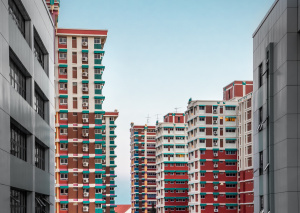
As part of the Care & Support Package, residents living in HDB public housing are also to receive Service and Conservancy Charge Rebates.[23] The following is a breakdown of the rebates given.
| Housing Type | Rebate Value | Refs. |
|---|---|---|
| 1 or 2-room flats | 3.5 months worth of rebates | [24] |
| 3 or 4-room flats | 2.5 months worth of rebates | |
| 5-room flats | 2 months worth of rebates | |
| Executive or multi-generation flats | 1.5 months worth of rebates |
Additional Initiatives
The following initiatives will only apply to eligible households and individuals:
- Yearly GST voucher to be doubled in amount[25]
- Larger households (ie. 5 or more members) to receive additional GST vouchers
- Low-income families to receive grocery vouchers worth S$100 in 2020 and 2021[26]
- Singaporeans above 50 years old to receive a one-time top-up of S$100 to their PAssionCard[27]
Other than the above, the government has also set aside the following funds:
- S$10 million of the S$1.6 billion to Self Help Groups[28]
- S$20 million of the S$1.6 billion to Community Development Councils[29]
Assurance Package (S$6 Billion)
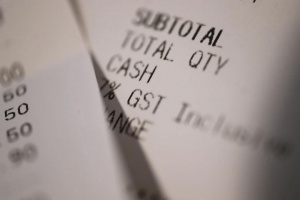
The government has allocated S$6 billion to an Assurance Package to help Singaporeans cope with the GST hike that is scheduled for 2025.[30][31]
Under this package, every adult Singaporean will receive cash payouts ranging from S$700 - S,$1600 over 5 years from when the package is introduced.[32] This sum is meant to offset minimally 5 years worth of expenses incurred as a result of the GST hike.
More funding for existing schemes
The following schemes will receive more funding from the government.
| Scheme | Government Top-Up (S$) | Beneficiary | Refs. |
|---|---|---|---|
| SkillsFuture Credit Top Up | + $500 (per person) | Singaporeans | [33] |
| SkillsFuture MidCareer Support Package | + $500 (per person) | (i) Employed Singaporeans
(ii) 40 - 50 years old |
[34] |
| Silver Support Scheme | + $290 million | (i) Bottom 20% of Singaporeans
(ii) 65 years old & above |
[35] |
| MediFund | + $200 million | Singaporeans unable to afford subsidised medical bills | [36] |
| Eldercare Fund | + $750 million | Elderly requiring healthcare | [37] |
| ComCare Fund | + $500 million | Low-income individuals and families | [38] |
| MOE Financial Assistance Scheme (FAS) | + $9 million | Singaporean students | [39] |
| Global Talent Ready Programme | Amount Undisclosed | Singaporean students | [40] |
The following schemes are also to be enhanced.
- Silver Housing Bonus and Lease Buyback Scheme: Individuals under this scheme will be provided with risk-free interest rates on their savings.[41]
- CPF Housing Grant: Eligible first- time flat buyers can receive up to S$160,000 in housing grants.[42]
- Central Provident Fund (CPF) Basic Retirement Sum: The next two cohorts of retirees will enjoy an increased Basic Retirement Sum from S$90,500 (2020) to S$93,000 (2021) and S$96,000 (2022).[43]
For companies & employees
The government has set aside S$8.3 billion to kickstart the transformation of enterprises and businesses in Singapore.[44] Certain new schemes such as the Jobs Support Scheme (JSS) are also meant to protect the interests of employees. The newly introduced initiatives target a range of beneficiaries - from Small Medium Enterprises (SMEs) to Trade Associations and Chambers (TACs).
New initiatives
| Initiative | Beneficiary | Incentive | Refs. |
|---|---|---|---|
| Jobs Support Scheme (JSS) | Singaporeans, PRs | Employers can claim up to 8% of each local employee's monthly wages* from October 2019 - December 2019.
*Capped at $3,600 per month. |
[45] |
| Employers | |||
| Corporate Income Tax Rebate | Companies | The government will offset 25% of the payable tax for eligible companies. The rebate is capped at S$15,000 per company. | [46] |
| StartupSG Equity | Tech start-ups | The government has allocated S$300 million to support this sector. | [47] |
| Heartland Enterprise Upgrading Programme | Heartland Enterprises | The government has allocated funds for up-skilling workers and improvements in infrastructure. | [48] |
| Executive-in-Residence Programme | TACs | The government will provide funding for TACs to hire experienced executives who can provide industry advice. | [49] |
| Enterprise Transform Package | SMEs | The package includes a 3-year programme that is meant to groom and train the business leaders of 900 companies. | [50] |
Existing initiatives
The following existing schemes will be enhanced.
| Scheme | Target Audience | New Incentives | Refs. |
|---|---|---|---|
| Wage Credit Scheme | Employers | 5% increase in government co-funding levels for employee wage increases. | [51] |
| Singaporean Employees | Workers earning up to S$5,000 will benefit from the Wage Credit Scheme. | [52] | |
| Enterprise Financing Scheme | Companies | Companies can get up to S$600,000 of the working capital loan - double the amount of 2019's maximum loan. | [53] |
| The government's risk share will increase to 80%. | |||
| Enterprise Development Grant | Small-Medium Enterprises | About 3,000 SMEs will be supported by this grant in 2020. | [54] |
Climate change: Incentives, Funds & Programmes
The government has dedicated funds to address climate change in Singapore. The new big-ticket investments are the Coastal & Flood Protection Fund as well as a close to S$1 billion injection into research in sustainability and urban solutions.[55]
Coastal & Flood Protection Fund (S$5 Billion)
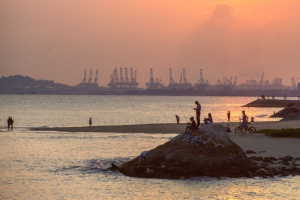
The Singapore government has set aside S$5 billion out of the S$106 billion budget for this fund.[56] This initiative is meant to keep Singapore safe from the threat of rising sea levels.[57]
EV Early Adoption Incentive
Individuals who buy electric vehicles (EV) will receive a 45% rebate on the additional registration fee. This incentive is effective from January 2021 and the rebate is capped at S$20,000.[58] This incentive is part of the government's goal to eradicate Internal Combustion Engine (ICE) vehicles by 2040.[59] Additionally, the government aims to have 28,000 EV charging ports islandwide by 2030. This is 17.5 times more than what Singapore has in 2020.[60]
Commercial Vehicle Emissions Scheme
There will also be a Commercial Vehicle Emissions Scheme. This scheme builds on the success of 2018's Vehicular Emissions Scheme (VES) where car-buyers and taxi operators are given a S$20,000 - $30,0000 rebate for choosing cleaner car models.[61]
HDB Green Towns Programme
The HDB Green Towns Programme will ensure that greenery and tree cover will make up 45 - 60% of new HDB developments.[62] In general, the programme has three goals, to (i) Cool down HDB estates, (ii) Recycle rainwater and (iii) Reduce energy consumption.
References / Citations
- ↑ “Budget 2020 to be delivered next Tuesday”. Channel News Asia. February 10, 2020. Accessed on 19 February 2020.
- ↑ “Mr HENG Swee Keat”. Prime Minister’s Office Singapore. Accessed 19 February 2020.
- ↑ Lee, Yen Nee.“$4 billion to help businesses and households amid coronavirus outbreak”. CNBC. February 18, 2020. Accessed 19 February 2020.
- ↑ “Budget 2020: Advancing as One Singapore”. Ministry of Finance Singapore. February 18, 2020. Accessed on 19 February 2020.
- ↑ "Responding to challenges in a new decade". The Straits Times. February 18, 2020. Accessed on 20 February 2020.
- ↑ Cheng, Kenneth. "Budget 2020: A cheat sheet". Today Online. February 18, 2020. Accessed on 20 February 2020.
- ↑ “Economic Survey of Singapore 2019 - Press Release”. Ministry of Trade and Industry Singapore. February 17, 2019. Accessed on 19 February 2020.
- ↑ Subhani, Ovais. “Singapore downgrades 2020 economic growth forecast to between -0.5 and 1.5% on coronavirus impact”. The Straits Times. February 17, 2020. Accessed on 19 February 2020.
- ↑ Sim, Royston. “Singapore Budget 2020: $6.4b to deal with virus crisis, economic uncertainties”. The Straits Times. February 19, 2020. Accessed on 19 February 2020.
- ↑ Ang Hwee Min. "S$77 million package to help taxi, private-hire drivers affected by COVID-19 outbreak". Channel News Asia. February 13, 2020. Accessed on 20 February 2020.
- ↑ Lam, Fiona. "Budget 2020: More help for 5 sectors directly hit by Covid-19". The Business Times. February 18, 2020. Accessed on 20 February 2020.
- ↑ Tang See Kit. "Budget 2020: S$4 billion support package for workers, firms amid COVID-19 outbreak". Channel News Asia. February 18, 2020. Accessed on 20 February 2020.
- ↑ Tang See Kit. "Budget 2020: S$4 billion support package for workers, firms amid COVID-19 outbreak". Channel News Asia. February 18, 2020. Accessed on 20 February 2020.
- ↑ Tang See Kit. "Budget 2020: S$4 billion support package for workers, firms amid COVID-19 outbreak". Channel News Asia. February 18, 2020. Accessed on 20 February 2020.
- ↑ Tang See Kit. "Budget 2020: S$4 billion support package for workers, firms amid COVID-19 outbreak". Channel News Asia. February 18, 2020. Accessed on 20 February 2020.
- ↑ Ang Hwee Min. "S$77 million package to help taxi, private-hire drivers affected by COVID-19 outbreak". Channel News Asia. February 13, 2020. Accessed on 20 February 2020.
- ↑ Ang Hwee Min. "S$77 million package to help taxi, private-hire drivers affected by COVID-19 outbreak". Channel News Asia. February 13, 2020. Accessed on 20 February 2020.
- ↑ Tang See Kit. "Budget 2020: S$4 billion support package for workers, firms amid COVID-19 outbreak". Channel News Asia. February 18, 2020. Accessed on 20 February 2020.
- ↑ Lam, Fiona. "Budget 2020: More help for 5 sectors directly hit by Covid-19". The Business Times. February 18, 2020. Accessed on 20 February 2020.
- ↑ Co, Cindy. “Budget 2020: S$1.6 billion Care and Support Package to help Singaporeans with household expenses”. Channel News Asia. February 18, 2020. Accessed on 20 February 2020.
- ↑ Yee, Jonathan. “S’poreans To Receive One-Off Payouts Up To $300 Under Budget 2020 Care & Support Package”. MustShare News. February 18, 2020. Accessed on 20 February 2020.
- ↑ “Care And Support Package”. Singapore Budget. Accessed on 20 February 2020.
- ↑ Cheng, Kenneth. “Budget 2020: S$100-S$300 cash for S’poreans aged 21 and older to ride out economic slowdown, Covid-19 crisis”. Today. February 18, 2020. Accessed on 20 February 2020.
- ↑ "Care And Support Package". Singapore Budget 2020. Accessed on 21 February 2020.
- ↑ “Care And Support Package”. Singapore Budget. Accessed on 20 February 2020.
- ↑ Tan, Theresa. “Singapore Budget 2020: Low-income families to get grocery voucher worth $100 a year”. The Straits Times. February 18, 2020. Accessed on 20 February 2020.
- ↑ Tan, Theresa. “Singapore Budget 2020: All adult Singaporeans to get one-off cash payout ranging from $100 to $300”. The Straits Times. February 18, 2020. Accessed on 20 February 2020.
- ↑ Lam, Fiona. “Budget 2020: Self-help groups to get S$10m grant to support needy families amid virus outbreak”. The Business Times. February 18, 2020. Accessed on 20 February 2020.
- ↑ Lam, Fiona. “Budget 2020: Self-help groups to get S$10m grant to support needy families amid virus outbreak”. The Business Times. February 18, 2020. Accessed on 20 February 2020.
- ↑ Lai, Linette. “Singapore Budget 2020: GST hike will not take place in 2021; $6b Assurance Package to cushion impact of hike”. The Straits Times. February 18, 2020. Accessed on 20 February 2020.
- ↑ Abdullah, Zhaki. “Budget 2020: GST to remain at 7% in 2021; S$6b package when it rises”. Channel News Asia. February 19, 2020. Accessed on 20 February 2020.
- ↑ Abdullah, Zhaki. “Budget 2020: GST to remain at 7% in 2021; S$6b package when it rises”. Channel News Asia. February 19, 2020. Accessed on 20 February 2020.
- ↑ “SKILLSFUTURE CREDIT”. SkillsFuture. Accessed on 20 February 2020.
- ↑ See, Sharon. “Budget 2020: New SkillsFuture Mid-Career Support Package for workers in 40s and 50s”. The Business Times. February 18, 2020. Accessed on 20 February 2020.
- ↑ Abu Baker, Jalelah. “Budget 2020: New scheme to help those with less CPF savings to save more”. Channel News Asia. February 18, 2020. Accessed on 20 February 2020.
- ↑ Abu Baker, Jalelah. “Budget 2020: Up to S$350m for social service agencies to tap on through new trust”. Channel News Asia. February 18, 2020. Accessed on 20 February 2020.
- ↑ Goh, Yan Han. “Singapore Budget 2020: $350m to support social service agencies and build giving culture; wage offsets for hiring those with disabilities”. The Straits Times. February 18, 2020. Accessed on 20 February 2020.
- ↑ Goh, Yan Han. “Singapore Budget 2020: $350m leg-up for social service agencies”. The Straits Times. February 19, 2020. Accessed on 20 February 2020.
- ↑ Yang, Calvin. “Singapore Budget 2020: More help to ensure every Singaporean student can reach potential, regardless of family income”. The Straits Times. February 18, 2020. Accessed on 20 February 2020.
- ↑ Ang, Hwee Min. “Budget 2020: New target for overseas opportunities for students, with focus on SE Asia, China, India”. Channel News Asia. February 18, 2020. Accessed on 20 February 2020.
- ↑ “Singapore Budget 2020 Full Coverage: COVID-hit sectors to get $4b and GST hike moved to 2025”. Singapore Business Review. February 18, 2020. Accessed on 20 February 2020.
- ↑ Yang, Calvin. “Singapore Budget 2020: More help to ensure every Singaporean student can reach potential, regardless of family income”. The Straits Times. February 18, 2020. Accessed on 20 February 2020.
- ↑ Lam, Fiona. “Budget 2020: Basic Retirement Sum set at S$93,000 for those turning 55 next year”. The Business Times. February 18, 2020. Accessed on 20 February 2020.
- ↑ Tan, Sue-Ann. "Singapore Budget 2020: $8.3b to be allocated for economic transformation and growth". The Straits Times. February 18, 2020. Accessed on 20 February 2020.
- ↑ “Jobs Support Scheme (JSS)”. Inland Revenue Authority of Singapore. February 19, 2020. Accessed on 19 February 2020.
- ↑ See, Sharon. “Budget 2020: Corporates to enjoy 25% income tax rebate, enhanced tax treatments”. The Business Times. February 18, 2020. Accessed on 19 February 2020.
- ↑ Tan, Sue-Ann. "Singapore Budget 2020: $8.3b to be allocated for economic transformation and growth". The Straits Times. February 18, 2020. Accessed on 20 February 2020.
- ↑ Tan, Sue-Ann. "Singapore Budget 2020: $8.3b to be allocated for economic transformation and growth". The Straits Times. February 18, 2020. Accessed on 20 February 2020.
- ↑ Tan, Sue-Ann. "Singapore Budget 2020: $8.3b to be allocated for economic transformation and growth". The Straits Times. February 18, 2020. Accessed on 20 February 2020.
- ↑ Tan, Sue-Ann. "Singapore Budget 2020: $8.3b to be allocated for economic transformation and growth". The Straits Times. February 18, 2020. Accessed on 20 February 2020.
- ↑ “Wage Credit Scheme (WCS)”. Inland Revenue Authority of Singapore. Accessed on 19 February 2020.
- ↑ Tjendro, Johannes. "Budget 2020: 5 things to know about plans to help workers and businesses amid COVID-19 challenges". Channel News Asia. February 18, 2020. Accessed on 20 February 2020.
- ↑ Tjendro, Johannes. "Budget 2020: 5 things to know about plans to help workers and businesses amid COVID-19 challenges". Channel News Asia. February 18, 2020. Accessed on 20 February 2020.
- ↑ Tan, Sue-Ann. "Singapore Budget 2020: $8.3b to be allocated for economic transformation and growth". The Straits Times. February 18, 2020. Accessed on 20 February 2020.
- ↑ "D. Sustaining Singapore’s Success For Our Future Generations". Singapore Budget 2020. Accessed on 20 February 2020.
- ↑ "Responding to challenges in a new decade". The Straits Times. February 18, 2020. Accessed on 20 February 2020.
- ↑ Tan, Audrey. "Singapore Budget 2020: New coastal and flood protection fund to protect Singapore against rising sea levels".The Straits Times. February 18, 2020. Accessed on 20 February 2020.
- ↑ Cheng, Kenneth. "Budget 2020: A cheat sheet". Today Online. February 18, 2020. Accessed on 20 February 2020.
- ↑ Cheng, Kenneth. "Budget 2020: A cheat sheet". Today Online. February 18, 2020. Accessed on 20 February 2020.
- ↑ "D. Sustaining Singapore’s Success For Our Future Generations". Singapore Budget 2020. Accessed on 20 February 2020.
- ↑ "D. Sustaining Singapore’s Success For Our Future Generations". Singapore Budget 2020. Accessed on 20 February 2020.
- ↑ Ng, Michelle. "Singapore Budget 2020: New programme to ensure sustainable living in HDB estates". The Straits Times. February 18, 2020. Accessed on 20 February 2020.

